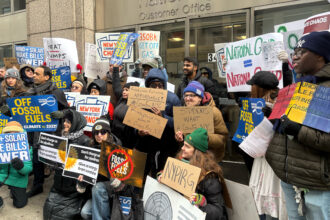The United States should act fast to build up the country’s manufacturing industry for renewable energy systems or risk losing green jobs to China and other low-wage nations, according to a new report by advocacy organization Apollo Alliance and Good Jobs First, a labor-oriented research group.
The report’s recommendations include fixing the nation’s renewable energy stimulus funding so recipients who relocate operations overseas are forced to repay their hefty government handouts.
"We don’t currently have the capacity to supply our own demand for clean energy products and systems," Sam Haswell, spokesperson for Apollo Alliance, told SolveClimate.
The U.S. is currently importing about 70 percent of its renewable energy parts from foreign countries, according to the report. If that continues, the report estimates, the U.S. will lose out on 100,000 clean energy manufacturing jobs and nearly 250,000 by 2030.
To gauge the direction of renewable energy manufacturing in America, the authors analyzed the list of winners of the Advanced Energy Manufacturing Tax Credit program, known as 48C credits. The $2.3 billion program, part of the 2009 Reinvestment and Recovery Act, provides a 30 percent tax credit for investments in new, expanded or re-equipped advanced energy manufacturing projects making materials for cleaner power generation.
The report focused on wind and solar plants, which accounted for about 68 percent of the payouts. Ninety domestic and foreign parent companies have received funding to build solar and wind plants in America, the report found. Of that total, 25 are investing in similar factories in America’s clean energy competitors: China, India, Mexico and Malaysia.
In fact, several of these companies — including Colorado-based Advanced Energy Industries, Arizona-based First Solar, China-based Suntech Power and California’s SunPower Corporation — are making low-wage nations their primary manufacturing hubs.
This is especially true of China, the current global leader in the manufacture of wind and solar components.
The pattern is a cautionary tale, the report suggests.
"While the 48C credits are likely leading these companies to pay more attention to U.S. production, it is also possible that their American manufacturing activities are little more than fig leaves meant to hide the fact that they are mainly relying on offshore low-wage activities," the authors wrote.
Stimulating U.S. Jobs Only
The report recommends the 48C program be extended by $5 billion, as President Obama proposed in his 2011 budget, but with a catch: a "clawback" provision that would allow the feds to take back taxpayer dollars from stimulus winners if they close up shop too soon in the U.S. and create jobs overseas.
"A clawback provision would only punish those companies that accepted a credit and then did not sustain their operations in the United States for some minimum period of time — say five, 10 years," Haswell said.
A group of Democratic U.S. senators has gone further.
Sens. Charles Schumer (D-N.Y.), Bob Casey (D-Pa.), Sherrod Brown (D-Ohio) and Jon Tester (D-Mont.) launched a campaign last week to suspend a related section of the Recovery Act, the section 1603 cash grant program, indefinitely. "until the law can be fixed." The program allocates 30 percent cash grants to renewable energy projects.
Schumer cited reports from the Investigative Reporting Workshop at American University that calculated 79 percent of $2.1 billion given out in clean-energy cash grants had gone to foreign companies.
Along with Sen. Arlen Specter (D-Pa.), the senators introduced a bill that would put a "buy American" provision on all projects getting government money under section 1603.
"Our domestic clean-energy sector has the potential to emerge as a global leader and it is counterproductive to invest U.S. stimulus funds in Chinese companies rather than our own," Schumer said.
Supporters of the program, including Energy Secretary Steven Chu, are not convinced. They said that while some jobs may end up overseas, the grants are creating thousands of U.S. jobs at a time when construction and manufacturing unemployment is in the double digits. A "buy American" requirement would mean stopping projects where two-thirds of the work is American and only a third is foreign and losing those American jobs.
"This proposal would torpedo one of the most successful job creation efforts of the Recovery Act, which has already preserved half of the 85,000 American jobs in the U.S. wind industry," said Denise Bode, CEO of the American Wind Energy Association (AWEA). It "would cost 50,000 American workers their jobs."
One high-profile target of Schumer’s campaign is a West Texas wind farm project that is being built by a U.S.-China coalition with over $400 million in cash grant help.
Opponents of the plan said its parts are being made in China, and that 85 percent of the 2,800 jobs expected to flow from project will end up there.
The group, comprised of the U.S. Renewable Energy Group, Cielo Wind Power LP and China’s Shenyang Power Group, vehemently disputed that figure.
"A minimum of 70 percent of each wind turbine in the 600 MW project, including the massive towers and blades, will be wholly manufactured in the United States and made entirely of American steel," said Cappy McGarr, managing partner at U.S. Renewable Energy Group.
McGarr said analyses have wrongfully assumed that jobs that do not qualify as either construction or operation of the wind farm would naturally go overseas. That is "incorrect," McGarr said, though he did not divulge any figures.
Job creation aside, cutting off the incentives would be a death knell for the U.S renewables market, McGarr added.
"Without the incentives, these projects would never materialize," he said. "The foreign investment would go to Europe or Asia, and America would be at an unfair disadvantage."
Comprehensive Climate Legislation Key
Haswell said Schumer’s intention was "good." However, he added: "It is not simply enough to impose ‘buy American’ provisions on stimulus funds, especially since many of these programs are set to expire at the end of 2011."
"The key to ensuring long-term job growth in the U.S. is through a combined strategy of increasing domestic clean energy demand by passing comprehensive climate and clean energy legislation," said Haswell, "while simultaneously making direct investments in clean energy manufacturing."
The jobs potential from a cap-and-trade bill, for instance, is estimated to be in the hundreds of thousands if not more.
A study by a network of renewable industry trade groups found that just a strong Renewable Electricity Standard (RES) of 25 percent by 2025 would create 274,000 jobs compared to doing nothing, with every state seeing job creation. Of those jobs, 50,000 would be solar related and 116,000 would go to the wind industry.
Currently, the U.S. Congress is embroiled in debate over America’s future climate and energy law, with cap-and-trade and a strong RES falling out of favor.
In a hearing last week before a U.S. senate committee on science and technology, Energy Secretary Chu said a domestic manufacturing boom in wind and solar was largely in the hands of Washington lawmakers.
The "best incentive" is to create home-grown demand for clean energy technology to lure in manufacturers, he said. "That’s one of the crucial things that Congress will hopefully help us with."
See also:
Made in America by China: New Turbine Factory Offers Glimpse into the Future
100% Renewables by 2030 for Less Than Fossil Power: A Case is Made
Obama’s Energy Plan: All of the Above — Including a Price on Carbon
About This Story
Perhaps you noticed: This story, like all the news we publish, is free to read. That’s because Inside Climate News is a 501c3 nonprofit organization. We do not charge a subscription fee, lock our news behind a paywall, or clutter our website with ads. We make our news on climate and the environment freely available to you and anyone who wants it.
That’s not all. We also share our news for free with scores of other media organizations around the country. Many of them can’t afford to do environmental journalism of their own. We’ve built bureaus from coast to coast to report local stories, collaborate with local newsrooms and co-publish articles so that this vital work is shared as widely as possible.
Two of us launched ICN in 2007. Six years later we earned a Pulitzer Prize for National Reporting, and now we run the oldest and largest dedicated climate newsroom in the nation. We tell the story in all its complexity. We hold polluters accountable. We expose environmental injustice. We debunk misinformation. We scrutinize solutions and inspire action.
Donations from readers like you fund every aspect of what we do. If you don’t already, will you support our ongoing work, our reporting on the biggest crisis facing our planet, and help us reach even more readers in more places?
Please take a moment to make a tax-deductible donation. Every one of them makes a difference.
Thank you,












